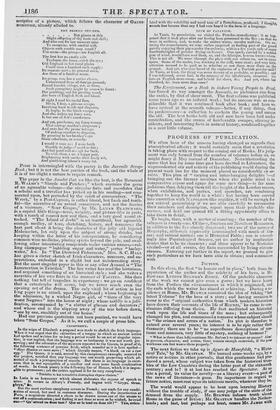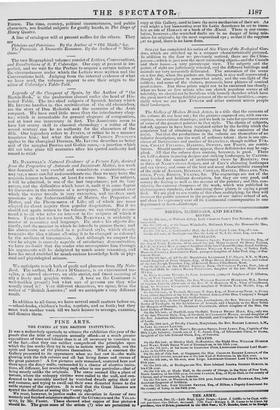PROGRESS OF PUBLICATION.
WE often hear of the seasons having changed as regards their atmospherical effects; it would certainly seem that a revolution is taking place with respect to the coming out of Books. If a judg- ment was only formed from the number of volumes before us, we might fancy it May instead of December. Notwithstanding the space that has for some time past been devoted to Literature, the unprecedented stir and activity of the publishing world during the present week has for the moment placed us considerably en ar- ri?re. This plan of " varying and interchanging delights "—of bringing out the literary novelties when the public mind is in comparative repose and agape for some new thing—is far more judicious than delaying them till the height.of the London season,
when exhibitions, and parties, and speeches, art' combining together to keep the world in a whirl : but having been carried into execution with NAPOLEON-like rapidity, it will be enough for our critical generalship if we are able carefully to reconnoitre their numbers and description, report upon their probable cha- racters., and hold our ground till a fitting opportunity offers to take them in detail.
To begin, then, with a matter of counting: the number of the volumes is twenty-one. Of these, fourteen are Novels or Romances, in addition to the five already dismissed; two are of the nature of Biography, although apparently iaternMigled with much of lite- rary and critical matter; one is Historical Fable ; one is exceed- ingly like Psychological Science, yet its author by implication denies that to be its character ; and three appear to be Statistics vivified—or at all events, dry facts surrounded by living circum- stances. Entering yet further in the report, we proceed to give such particulars as we have been able to obtain; and commence with
FICTION.
In this class, the first "in honour and in place," both from the reputation of the author and the celebrity of his hero, is Mr. EDWARD LYTTON BULWER'S Rienzi. Of the probable character of the work we cannot give even a guess; but we have learnt from the Preface the circumstances in which it originated, and the ends which the writer has aimed at achieving. During a re- sidence at Rome, Mr. BULwER conceived the idea of taking "her latest Tribune" for the hero of a story ; and having occasion to recur to the " original authorities from which modern historians have drawn their accounts of the life of RIENZI," he came to con- clusions differing from theirs. He first meditated an historical work upon the life and times of the man; but subsequently changed his plan, and commenced a romance whose subject should be "the crimes and errors of a nation." Its plot is therefore to extend over several years; its interest is to be epic rather than dramatic; there are to be "no superfluous descriptions of cos- tume and manners, very little of mystery, nothing of humour ! "What is there then left(continues Mr. Bulwer) to interest or amuse? Alas! in passion, character, and action, there remain enough materials, if the poor workman can but weave them properly."
The next fiction we take up is Agnes de ManVeldt, ‘.` a Histo- rical Tale," by Mr. GRATTAN. We learned some weeks ago, by a notice or notices in other journals, that this gentleman had pro- duced a novel, whose subject was taken from the historical trou- bles of the Low Countries during the latter part of the sixteenth century; and lo ! it at last has reached the Spectator. At so late a period, its value for novelty—as a literary event—a part of the news of literature—is gone. Its importance in regard to future notice, must rest upon its intrinsic merits, whatever they be.
The world would appear to be bent upon learning History without the trouble of study, if one may judge of the state of the demand from the supply. Mr. BULWER infuses truth about Rome in the guise of fiction ; Mr. GRATTAN handles the Nether- lands; and last, but perhaps not least, comes Mr. JAMES wish France. The time, country, political circumstances, and public characters, are fruitful subjects for goodly hands, in The Days of Henry Quatre.
A line of catalogue will at present suffice for the others. They are
Plebeians and Patrician..'. By the Author of " Old Maids," &c. The Parricide. A Domestic Romance. By the Author of " rimus."



























 Previous page
Previous page